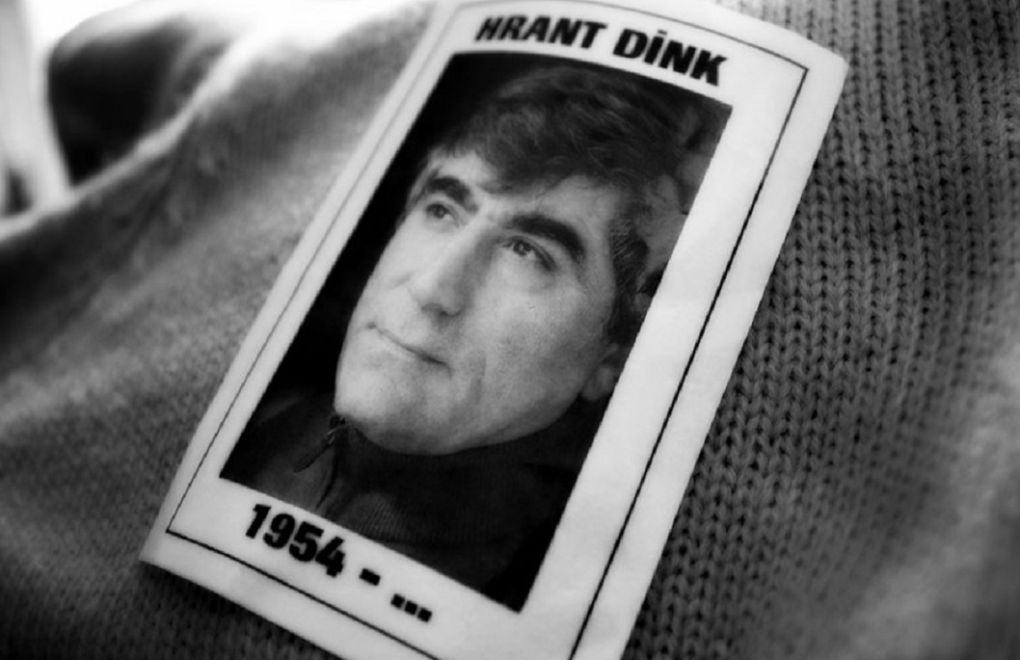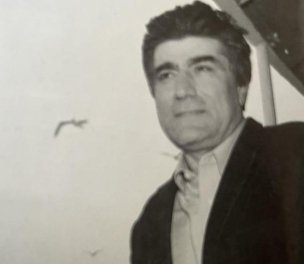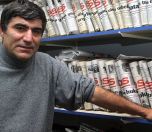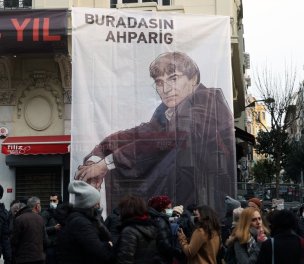Click to read the article in Turkish
Agos Newspaper Editor-in-Chief Hrant Dink was killed in an armed attack on Şişli Halaskargazi Street, where the newspaper was located, on January 19, 2007. Tomorrow marks his 15th death anniversary.
On this occasion, the Journalists' Association of Turkey (TGC) and the Press Council have released written statements in memory of the late journalist and expressed their requests for justice one more time.
A commemoration ceremony will be held for Hrant Dink in front of the-then Agos Newspaper in İstanbul's Şişli tomorrow at 3 pm.
'We cannot talk about press freedom'
In its statement, the TGC has underlined that Hrant Dink, who defended universal peace, is known and remembered for his struggle for fraternity between the peoples of the two countries, Armeni̇a and Turkey.
The Association has raised concerns that "we live in a country where the instigators and hired guns of 66 journalists' murders cannot be revealed."
"In an environment where the trial, detention and imprisonment of journalists over their thoughts and writings have become ordinary, we cannot talk about press freedom," the TGC has underlined, recalling that "the colleagues who have taken up the duty to convey the truth to the people in an accurate and impartial manner are still working under pressure and threats."
The TGC has said, "Never forgetting Hrant Dink, who had long made efforts to make democracy well established in Turkey, we, his colleagues, are still waiting for justice to be served in the court cases filed for his murderers and instigators."
"We know that we are all responsible for eliminating hate speech in the media in order to peacefully live in a society where there is no racism and discrimination," the Association has stated further, "commemorating Hrant Dink one more time with love and longing."
'He defended freedom of expression, press'
In its statement, the Press Council has said, "We are sad again on the 15th anniversary of Hrant Dink's massacre by dark forces."
The Council has recalled that "Dink, as an intellectual in love with his country, waged a lifelong struggle to ensure that not war, but peace prevail and not hostility, but fraternity flourish in this land."
"He was a good journalist; he always defended people's right to get information and freedom of expression and press," the Council has said, recalling that "he was massacred by a hired gun in an assassination carried out by dark circles who were enemies of peace and freedom."
The Council has raised concerns that "in the 15 years that have passed since then, the dark forces who had planned the Hrant Dink assassination behind the scenes cannot be fully revealed."
"Unfortunately, as is the case with the murders of other journalists and intellectuals, we keep on living in shame for being unable to bring the Hrant Dink murder into light," the Press Council has said, "respectfully commemorating Hrant Dink on the 15th anniversary of his massacre."
From the nursery school to Agos, a life-long struggleBorn in Malatya province in September 1954, Agos Editor-in-Chief Hrant Dink was killed in an armed attack on the Şişli Halaskargazi Street, where the newspaper was located, at 3 pm on January 19, 2007. Founded in the year of his passing, the Hrant Dink Foundation shares the following biography of the late journalist in brief: Hrant Dink was born in Malatya on September 15, 1954. He moved to Istanbul with his family when he was five years old. After his mother and father were separated, Hrant Dink and his two brothers went to live at the Gedikpasa Armenian Protestant Church Nursery School. The three brothers all attended Incirdibi Primary school, which was run by the same church, in winter time and lived at the Tuzla Armenian Children's Camp of the school during their summers. Hrant Dink graduated from Bezciyan junior high school and studied at the Surp Hac Tibrevank boarding school before he completed his high school education at Sisli High. He married Rakel Yagbasan, originally from the Armenian Varto tribe from Silopi in the Southeast of Turkey. They had three children. Dink studied zoology and philosophy at Istanbul University's Faculty of Science. He abandoned his dreams of a biological philosophy department at the university at the expense of his active engagement in the developing politics of the left. He was worried that his political engagement could be linked to his Armenian identity and harm the Armenian community living in Turkey, so he changed his name to the Turkish name Firat through the court verdict. Within this period Hrant Dink and his wife Rakel took over the administration of the Tuzla Children's Camp, where they themselves once grew up and began looking after countless Armenian children. The camp underwent difficult times under the accusation of breeding Armenian militants there and was finally confiscated by the State in 1983. Following the closure of the camp, Dink was taken into custody and arrested three times due to his political views. During the 1990s, Hrant Dink ran a bookstore with his brothers in Istanbul. He also started writing for the Armenian daily newspaper, Marmara. He especially wrote reviews of books about Armenian history printed in Turkey under the pseudonym Cutak which means, violin in Armenian. On April 5th 1996, Hrant Dink took part in the foundation of Agos - the first weekly newspaper to be published in Istanbul in both Turkish and Armenian. The word Agos was used in both languages meaning the place where the plough opens a hole in the soil to give the seed in as a source of fertility. As the editor in chief of Agos, Hrant Dink attracted public attention with his rhetoric, which opened new frontiers of debate. He also wrote columns for YeniYüzyıl and BirGün daily newspapers. In 2002 Hrant Dink was sued for a speech he made at a conference in Urfa about identity and citizenship. It was 2006 by the time he was finally acquitted. However, the real intense period of court cases he was subjected to began in February 6, 2004 when an article was published in Agos under his name claiming that Sabiha Gokcen, the step-daughter of Ataturk, the founder of the Turkish Republic, might be of Armenian origin and had relatives in Armenia. In the story, entitled Secret of Sabiha Hatun, Hripsime Sebilciyan, an Armenian from Gaziantep, the Southeast of Turkey, who later took Armenian citizenship, claimed that she was Gökçens niece and Sabiha Gökçen was an Armenian orphan adopted from an orphanage. Despite the supportive report of court experts stating that the newspaper article bore no element of any crime at all, Hrant Dink was still convicted on charges of "publicly insulting and degrading Turkishness'' and sentenced to 6 months in jail by Sisli Criminal Court in Istanbul on October 7, 2005. The verdict was approved by the Ninth Penalty Council of the Supreme Court. When Dink made a statement on the verdict, a new case was filed - this time on charges of attempting to influence the judiciary. During the first hearing of the court case a group of people who demanded to be accepted as an intervening party in the case, protested against Hrant Dink, both outside the court house as well as in the corridors of the building. Hrant Dink had to walk to the courtroom through a line of police, accompanied by his lawyer. As he passed, people tried to attack him, insulted him and spat at him. A group of people who were allowed to enter the courtroom threw coins and pens as well as insulting and threatening the lawyers. After the hearing when Hrant Dink left the court house in a police vehicle, the police had to accompany his lawyers to another police bus which was brought right in front of the courthouse to save them from the fury of the angry crowd. Finally, following another story in Agos entitled 1 vote against 301 published on July 21st, 2006 another court case was opened against Hrant Dink, his son and acting editor of Agos, Arat Dink, and one of the main editors Sarkis Seropyan. The story that was published in Agos and led to this prosecution, quoted a statement that Hrant Dink had previously made to Reuters news agency. Referring to 1915 he had said of course this is a genocide because the result reveals and names the act itself. You see that a nation that was living on this land for four thousand years vanished after what happened. This statement he made to Reuters was later published in many Turkish newspapers as well as Agos. But it was only the editors of Agos who were prosecuted under Article 301 for "insulting Turkishness." This court process continued after Hrant Dink was shot in front of his Office in Agos on January 19, 2007. After the assasination, previous charges against him were dropped. Click here for the full version of the biography |
(AÖ/SD)





as.jpg)





